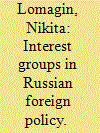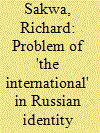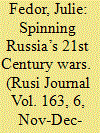| Srl | Item |
| 1 |
ID:
112790


|
|
|
|
|
| Publication |
2012.
|
| Summary/Abstract |
Among the domestic interest groups that play a role in influencing Russian foreign policy the Russian Orthodox Church has become an important actor. Its most important role has been that of supporting the emergence of a new nationalist Russian identity to undergird Russian policy. On specific policy issues, it has advocated the political reunification of Eastern Slavic Orthodox peoples, the emergence of a multipolar international system and the restatement of traditional values as the foundation for the pursuit of global human rights.
|
|
|
|
|
|
|
|
|
|
|
|
|
|
|
|
| 2 |
ID:
112787


|
|
|
|
|
| Publication |
2012.
|
| Summary/Abstract |
A new era in international politics is gradually taking shape in which the legacy of the Cold War is gradually fading, but in which new lines of division are emerging. The major institutions of the Cold War period are undergoing a long decay although the political processes associated with them are becoming increasingly dysfunctional. New forms of multi-polarity are taking shape accompanied by the struggle between defenders of the status quo and those ready to adapt to the structural revisionism inherent in the new pattern of international politics. In all of this, Russia acts as the bellwether, developing as a distinct and separate pole in the international system rather than joining the Western constellation, as was anticipated after the end of the Cold War. Russia's great power identity in the international system is accompanied by domestic systemic specificities, which reinforce differentiation at the structural level. Russia's neo-revisionism does not repudiate the present balance in international order, but seeks to create what it considers to be a more comprehensive and equal system. This can be seen in its various forms of interaction and modes of engagement with 'the international'. In methodological terms, the attempt to analyse these changes through a Cold War lens is a categorical error that perpetuates anachronistic paradigms. By disaggregating Russia's engagement with the international into a number of distinct processes, we can delineate more clearly the interaction of structural and systemic factors that sustain Russia's neo-revisionism.
|
|
|
|
|
|
|
|
|
|
|
|
|
|
|
|
| 3 |
ID:
155568


|
|
|
|
|
| Summary/Abstract |
Russia continues to be caught between a need to integrate itself into the West and a desire to maintain its independence from the West.
|
|
|
|
|
|
|
|
|
|
|
|
|
|
|
|
| 4 |
ID:
163350


|
|
|
|
|
| Summary/Abstract |
In this article, Julie Fedor examines contemporary Russian militarism through an introduction to one of its most high-profile representatives, the novelist, Chechen war veteran and media personality Zakhar Prilepin. She focuses on Prilepin’s commentary on war and Russian identity, locating his ideas within a broader strand of Russian neo-imperialism.
|
|
|
|
|
|
|
|
|
|
|
|
|
|
|
|